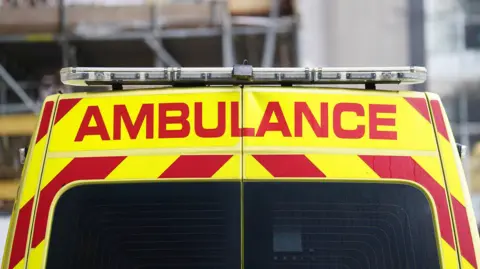Man died after 999 was called five times - inquest
 PA Media
PA MediaA woman had to dial 999 five times before an ambulance was sent for her partner who had a treatable bowel condition, an inquest has heard.
Charles Devos, 54, died on on 9 January 2021 after suffering a cardiac arrest at his home in Marazion, Cornwall.
The inquest in Truro heard Mr Devos's condition had become untreatable by the time his partner Hayley Hicks called emergency services for a third time.
She first called 999 at about 22:55 GMT on 8 January and her fifth and final call was placed at 16:23 the following day, when she told the operator he was in dreadful pain, the inquest was told.
'Systematic failure'
An ambulance arrived at their home at 16:30 but Mr Devos died a short time later.
Assistant coroner Guy Davies said Mr Devos had been a fit and healthy man prior to a small bowel infarction.
He said he had died from a treatable bowel condition and blamed extreme operational pressures on the ambulance service.
There were missed opportunities to treat him, he said.
Mr Davies said: "There was systemic failure within the system of health and social care which was causative of Charles' death."
The assistant coroner for Cornwall said his death was avoidable.
He said he would be writing to the health secretary about the failures.
'Sorry for unacceptable delay'
In a joint statement, the South Western Ambulance Service NHS Foundation Trust, Royal Cornwall Hospitals NHS Trust and NHS Cornwall and Isles of Scilly Integrated Care Board, apologised for the delay.
It said: “We are sorry for the unacceptable delay in the care that Mr Devos received in 2021. We would like to extend our sincere condolences to his family.
“Delays in emergency care are not something we want any of our patients to experience, and our teams are working incredibly hard to make improvements so that everyone can access the right care when they need it.
“We have made significant changes to strengthen our community and home-based services.
“The increased access to alternative community services will help reduce avoidable admissions and delays, which can lead to harm for people in need of emergency acute hospital care.”
Follow BBC Cornwall on X, Facebook and Instagram. Send your story ideas to [email protected].
